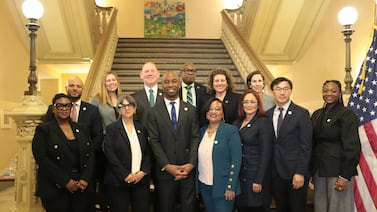Sign up for Chalkbeat Tennessee’s free daily newsletter to keep up with Memphis-Shelby County Schools and statewide education policy.
A longtime turnaround program that supports the Memphis district’s lowest-performing schools appears to be winding down, and it’s not yet clear what will replace it.
Memphis-Shelby County Schools’ Innovation Zone, known as the iZone, will no longer offer schools an extended hour of instructional time each day, Superintendent Marie Feagins recently told staff. The reduction in hours is likely to end the additional compensation teachers in those schools received for their time. That would remove two key pillars of a program that received national attention in its early years for outpacing efforts of the state-run school takeover model, the Achievement School District.
Some of those gains stalled as the Memphis program expanded — and as it struggled to maintain funding — illustrating the challenges of improving multiple chronically low-performing schools.
The changes at MSCS coincide with an upheaval in Tennessee’s school turnaround efforts, leaving major questions about how the lowest performing schools will be prioritized. Tennessee was once considered a turnaround pioneer, thanks in part to a $500 million award in 2010 from the federal Race to the Top competition to implement various education reforms.
But a new hire in Memphis, announced late Friday, suggests new plans for improvement could be on the way after all. Feagins selected Roderick Richmond, a career education administrator in Memphis, to oversee the district’s lowest performing schools.
She recently laid out her plans to reorganize the district’s schools into three new categories based on their state letter grades, which were assigned to schools for the first time last fall under a new formula that stresses achievement more than growth.

Richmond, an architect of the iZone, will take on D and F schools in his new role as Transformation Officer. The schools are now in the “Supe” category, short for superintendent. Schools with C grades will be called “Ignite” schools, and A and B schools will be called “Soar” schools. The categories could help determine how resources are allocated to schools and offer what Feagins says will be more appealing labels than letter grades.
“It’s tough when your school has been branded and labeled as an ‘F,’” Feagins told board members during a May meeting.
While the district’s budget proposals have suggested additional staff will be available to the Supe schools, they haven’t been specific about how the offerings will compare with existing iZone resources.
The Supe category comprises more than 70 schools, Feagins said, or about double the iZone’s current 36 schools.
The iZone started out with just eight schools, and by 2019, it had grown to 23. At that time, researchers found that gains for the iZone and the ASD had stalled, and pointed to high teacher turnover and the struggle to recruit top teachers as replacements as possible challenges. The model wasn’t necessarily unsuccessful, the researchers said, but they raised concerns about being able to replicate its features at a large scale.
Even so, in recent years, the iZone has continued growing, absorbing schools that languished in the state’s ASD. At least one of those schools, Whitney Elementary, has since moved off of the list of the state’s lowest performing schools since returning to the district. More ASD schools and students are coming back to MSCS as the state takeover district continues to unwind.
Reflecting on Tennessee’s turnaround programs in 2021, Richmond told Chalkbeat that more collaboration among communities, the district, and the state could have improved outcomes for struggling schools.
It isn’t clear what Feagins believes any new turnaround model should include. Asked by Chalkbeat if removing the extra hour of instruction would effectively end the so-called iZone program, Feagins struggled to respond.
Tito Langston, the district’s chief financial officer, said at the time that MSCS will continue to receive the federal funds it receives for its lowest-performing schools. But those funds are disbursed based on a federal accountability system that separated from the state’s system when Tennessee leaders revamped the letter grade formula. That means that not all D and F “Supe” schools will have access to additional federal dollars.
The district did not respond to questions seeking clarification in time for the publication of this story.
Changes for the upcoming academic year are expected to be final once the school board votes on its budget later this month. The meeting has yet to be scheduled. Look to the school board’s website for a date.
Laura Testino covers Memphis-Shelby County Schools for Chalkbeat Tennessee. Reach Laura at LTestino@chalkbeat.org.





